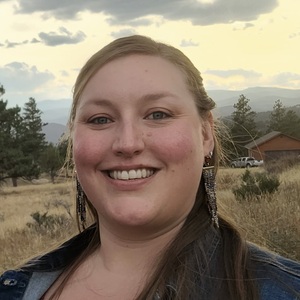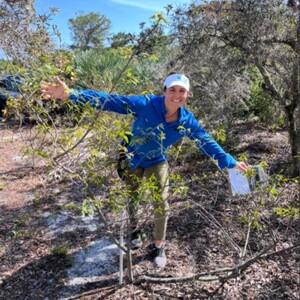-
 Mason Webb 7/31/2025 8:12 AM
Mason Webb 7/31/2025 8:12 AM- Foodie 🍱
This is so cool and something I didn't even think of paying attention to. Will definitely look at it much more closely when shopping!
Emily Henderson
POINTS TOTAL
- 0 TODAY
- 0 THIS WEEK
- 341 TOTAL
participant impact
-
UP TO2.0advocacy actionscompleted
-
UP TO300minutesspent learning
Emily's actions
First Steps: Start with You
Understand Plastic’s Impact on My Health
Plastics can leach harmful chemicals into food, water, and the air we breathe. I will spend 15 minutes learning about the health impacts of plastic exposure and explore safer swaps — like choosing glass or stainless steel over plastic for food storage and drinking water.
First Steps: Start with You
Understand plastic labels
Those recycling numbers and symbols can be confusing. I will spend 10 minutes learning what different plastic labels mean, including what can and can’t be recycled, to make more informed choices when I shop.
First Steps: Start with You
Learn how plastic is made
Understanding the origins of plastic helps us see its environmental impact more clearly. I will spend 15 minutes learning how plastic is made — from fossil fuels to finished product — and reflect on how that knowledge influences my choices.
First Steps: Start with You
Find out why plastic recycling isn’t working as we expect and where plastics end up
Many of us recycle with good intentions, but most plastic doesn’t get recycled. I will spend 15 minutes learning why plastic recycling falls short and what really happens to plastic waste.
First Steps: Start with You
Discover the difference between bioplastics, compostable plastics, and recyclable plastics
Not all “eco-friendly” plastics are created equal. I will spend 15 minutes exploring the differences between bioplastics, compostable plastics, and recyclable plastics—and what happens to each at the end of its life.
Lead the Way: Shape Your Community
Promote plastic awareness during an event or meeting
Events are powerful moments to inspire change. I will include a brief message, resource, or tip about reducing plastic at a meeting, celebration, or community gathering I attend or help organize.
Participant Feed
-
REFLECTION QUESTION
 Lead the Way: Shape Your CommunityWhat’s something you said or heard that you think might stick with people after the event? Did your information spark any interesting conversations or questions?
Lead the Way: Shape Your CommunityWhat’s something you said or heard that you think might stick with people after the event? Did your information spark any interesting conversations or questions?
 Emily Henderson 7/28/2025 7:54 AMI mentioned how the chasing arrows symbol is often only put on products to help sell them when in reality those items may not be recyclable. I tried to emphasize a need to refuse single serve plastics and focusing on reusable items. This did spark interest with some of my friends who do want to be more aware of their family's footprint
Emily Henderson 7/28/2025 7:54 AMI mentioned how the chasing arrows symbol is often only put on products to help sell them when in reality those items may not be recyclable. I tried to emphasize a need to refuse single serve plastics and focusing on reusable items. This did spark interest with some of my friends who do want to be more aware of their family's footprint -
REFLECTION QUESTION
 First Steps: Start with YouHow do these different materials shift your sense of what’s truly “sustainable” — and what’s just marketing? Are bioplastics accepted by your city's waste management?
First Steps: Start with YouHow do these different materials shift your sense of what’s truly “sustainable” — and what’s just marketing? Are bioplastics accepted by your city's waste management?
 Emily Henderson 7/11/2025 3:19 PMIt is interesting to understand that there is no regulation in biodegradable products and how a lot of it is just for marketing's sake and they use similar chemicals to produce and some that have not been tested to see what issues they may cause. Bioplastics are not accepted in our city.
Emily Henderson 7/11/2025 3:19 PMIt is interesting to understand that there is no regulation in biodegradable products and how a lot of it is just for marketing's sake and they use similar chemicals to produce and some that have not been tested to see what issues they may cause. Bioplastics are not accepted in our city. -
REFLECTION QUESTION
 First Steps: Start with YouWhat was the most eye-opening fact you learned about the limits of recycling, and how might it shift your habits? How do you feel knowing that so much of what we put in recycling bins may never actually be recycled? What should we do differently?
First Steps: Start with YouWhat was the most eye-opening fact you learned about the limits of recycling, and how might it shift your habits? How do you feel knowing that so much of what we put in recycling bins may never actually be recycled? What should we do differently?
 Emily Henderson 7/09/2025 2:01 PMI understand that waste management companies make more off of landfills and incinerating then they do off of properly recycling items however I wish both manufacturers and waste management companies are held more accountable. For manufacturers to stop using the chasing arrows symbol as a marketing ploy and only put it on products that can be recycled as well as using recycled products in their packaging to encourage waste management to take the time to create reusable products like AMBR does.
Emily Henderson 7/09/2025 2:01 PMI understand that waste management companies make more off of landfills and incinerating then they do off of properly recycling items however I wish both manufacturers and waste management companies are held more accountable. For manufacturers to stop using the chasing arrows symbol as a marketing ploy and only put it on products that can be recycled as well as using recycled products in their packaging to encourage waste management to take the time to create reusable products like AMBR does.-
 Kristi Trujillo 7/18/2025 12:08 PM
Kristi Trujillo 7/18/2025 12:08 PM- TEAM CAPTAIN
SO TRUE!! I was reading about how some recycling initiatives were really only created to help plastic producers and bigger corporations continue to greenwash and pollute under the guise the saving the planet! That makes me so angry!!
-
-
REFLECTION QUESTION
 First Steps: Start with YouWhat do you think the confusion around plastic labels says about our waste systems — and how could they be improved? What role do you think clear labeling should play in helping people make better choices — and who should be responsible for that?
First Steps: Start with YouWhat do you think the confusion around plastic labels says about our waste systems — and how could they be improved? What role do you think clear labeling should play in helping people make better choices — and who should be responsible for that?
 Emily Henderson 7/09/2025 1:17 PMIt is disappointing how people do see the recycling symbol. I think it could be improved by having waste management businesses clarify what is accepted in different areas and even labeling recycling bins with numbers that are accepted to be recycled at home and more information and education to show what would not be accepted by your waste management system and where things can be taken to get recycled even if it's not accepted by your recycling pickup. I realize most of this can be found online but pushing on education for communities whether in schools or from trash companies could make an impact. Clear labeling should be the manufacturers responsibility but also waste management to ensure homes are helping and not hindering their process.
Emily Henderson 7/09/2025 1:17 PMIt is disappointing how people do see the recycling symbol. I think it could be improved by having waste management businesses clarify what is accepted in different areas and even labeling recycling bins with numbers that are accepted to be recycled at home and more information and education to show what would not be accepted by your waste management system and where things can be taken to get recycled even if it's not accepted by your recycling pickup. I realize most of this can be found online but pushing on education for communities whether in schools or from trash companies could make an impact. Clear labeling should be the manufacturers responsibility but also waste management to ensure homes are helping and not hindering their process. -
REFLECTION QUESTION
 First Steps: Start with YouWhat surprised you the most about the health impacts of plastic exposure, and how might this new understanding influence the choices you make around food storage and everyday products?
First Steps: Start with YouWhat surprised you the most about the health impacts of plastic exposure, and how might this new understanding influence the choices you make around food storage and everyday products?
 Emily Henderson 7/02/2025 1:37 PMI have known that plastics have been a concern for being carcinogens, neurotoxicants, and endocrine disruptors however had gotten kind of numb to the things I buy. What surprised me the most is some plastics are absorbed in our bloodstream and stay in our body till the day we die. I will do my best to not weigh down my body with more of these toxins that are already passengers in my body for the rest of my life.
Emily Henderson 7/02/2025 1:37 PMI have known that plastics have been a concern for being carcinogens, neurotoxicants, and endocrine disruptors however had gotten kind of numb to the things I buy. What surprised me the most is some plastics are absorbed in our bloodstream and stay in our body till the day we die. I will do my best to not weigh down my body with more of these toxins that are already passengers in my body for the rest of my life.-
 Debi Luke 7/02/2025 2:28 PM
Debi Luke 7/02/2025 2:28 PM- TEAM CAPTAIN
- Wildlife Guardian 🦉
-
 Christine Raininger 7/02/2025 1:46 PM
Christine Raininger 7/02/2025 1:46 PM- Wildlife Guardian 🦉
Good on you Emily. You are doing yourself (and your loved ones) a favor by avoiding these additional toxins whenever possible.
-
-
REFLECTION QUESTION
 First Steps: Start with YouHow does understanding the origin of plastic change the way you think about using it in everyday life?
First Steps: Start with YouHow does understanding the origin of plastic change the way you think about using it in everyday life?
 Emily Henderson 7/01/2025 6:47 AMIt is interesting to think about how sap from gum trees a natural polymer and has plastic-like qualities. It was wild to learn that plastics arose through a need to source a different material than ivory to make billiard balls and combs. Not surprising that consumerism lifted it into all of the types of single serve or plastic in general that there is today.
Emily Henderson 7/01/2025 6:47 AMIt is interesting to think about how sap from gum trees a natural polymer and has plastic-like qualities. It was wild to learn that plastics arose through a need to source a different material than ivory to make billiard balls and combs. Not surprising that consumerism lifted it into all of the types of single serve or plastic in general that there is today.-
 Kristi Trujillo 7/01/2025 8:41 AM
Kristi Trujillo 7/01/2025 8:41 AM- TEAM CAPTAIN
-
 Emily Henderson 7/01/2025 6:52 AMIt makes me realize that we can also find ways to replace the plastics that have become such a huge part of society if we are present in the choices we make for food, clothing and products we use daily.
Emily Henderson 7/01/2025 6:52 AMIt makes me realize that we can also find ways to replace the plastics that have become such a huge part of society if we are present in the choices we make for food, clothing and products we use daily.
-
-
 Emily Henderson 6/30/2025 1:47 PMGrowing up my dad was big on making my siblings and I aware of things that should be recycled and ensuring things were rinsed properly before throwing in the bin. After the first bit of reading and videos, I understand why it is more impactful if we are aware of where plastics are in our life and how to reduce our use, not necessarily fill up our recycling bin.
Emily Henderson 6/30/2025 1:47 PMGrowing up my dad was big on making my siblings and I aware of things that should be recycled and ensuring things were rinsed properly before throwing in the bin. After the first bit of reading and videos, I understand why it is more impactful if we are aware of where plastics are in our life and how to reduce our use, not necessarily fill up our recycling bin.-
 Kristi Trujillo 7/01/2025 8:43 AM
Kristi Trujillo 7/01/2025 8:43 AM- TEAM CAPTAIN
Agreed! I always remind my fiancé to wash our plastics before putting in recycling but perhaps I can be better about giving them another life BEFORE that...
-